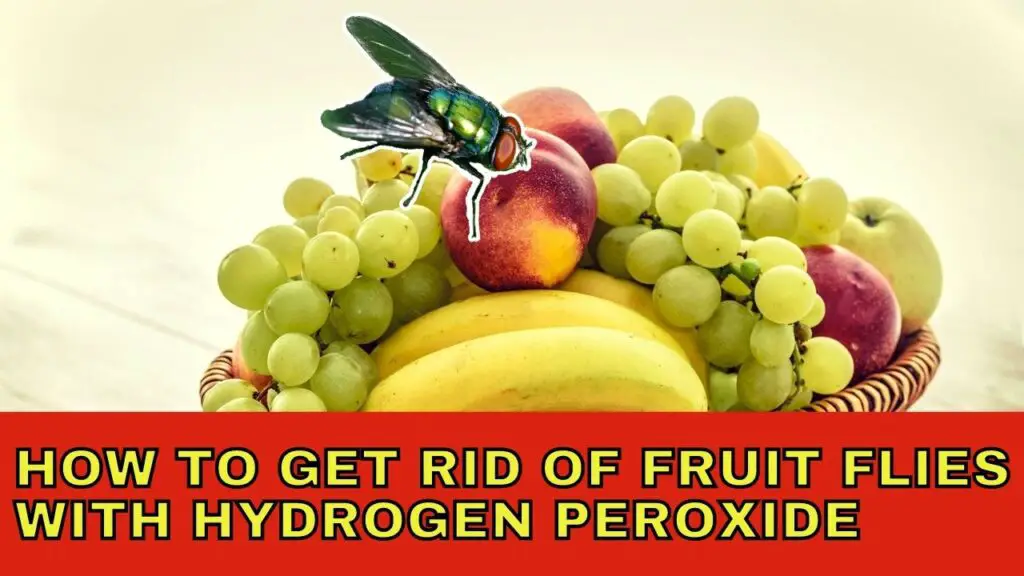When we think of summer, we think of picnics, beach days, and al fresco dining: bliss. However, one of the not-so-great things about summer is the return of pesky fruit flies.
Annoying as they may be, the good news is fruit flies are relatively easy to get rid of using products you already have in your kitchen cupboards, like hydrogen peroxide.
What Attracts Fruit Flies to your Home?
How do fruit flies even get inside your house? As temperatures rise, we tend to open doors and windows to cool our homes down. Fruit flies take advantage of the opportunity and make their way indoors.
Having fruit flies buzz around your kitchen is not ideal, but the real issue begins when the flies lay eggs in your home. Fruit flies will lay around 500 eggs when given the chance.
What Time of Year Do you See Fruit Flies?
It’s possible to spot fruit flies flying about your home all year round, but they are a particularly common occurrence in late summer and early fall. Why? When the warm weather comes, we’re more likely to have ripe fruit left out in our kitchens. Fruit flies are attracted to this ripe fruit, as well as vegetables, garbage disposals, trash cans, cleaning cloths, and empty cans and bottles.
Essentially, fruit flies are on the hunt for anything that has a moist layer of fermenting organic material that the flies can eat and breed near.
Fruit Flies vs. Gnats
Contrary to popular opinion, fruit flies and gnats are not the same creatures (although they are very similar). Fruit flies are a light orangey-red color with red eyes, while gnats are smaller and typically black, with grey or translucent wings.
Small bugs flying around your plants are most likely fungus gnats. However, if you spot swarms of bugs buzzing around fruit bowls, pantries, garbage disposal, trash cans, or other similar areas in your home, these are probably fruit flies.
How to Get Rid of Fruit Flies Once and For All
The first step in getting fruit flies out of your home is to get rid of anything that is attracting them.
Try these tips:
- Don’t leave ripe fruit and vegetables sitting out, pop them in the fridge
- Rinse items (canned foods, beverages, etc.) thoroughly before tossing them in the trash
- Make sure the lids are properly placed on trash cans
- Clean up spills quickly to avoid attracting fruit flies
- Regularly clean hard-to-reach places like underneath the fridge, blenders, toasters, and other appliances where food residue can build up
Removing Fruit Flies from Plants
If there are fruit flies swarming around your plants, hydrogen peroxide can ward off the flies without killing your plants.
To use on plants, make a spray. In a spray bottle, add one part hydrogen peroxide to three parts water and spray around your plants to say goodbye to fruit flies and grants for good.
You can use the solution on the soil and ground around your plants. Don’t panic when you see some foam or bubbles – this is a sign that the formula is working. When the bubbles disappear, this means the carbon peroxide has decomposed through the water and oxygen molecules.
The carbon peroxide will kill any fruit flies, eggs, or larvae that come into contact with it. Repeat this process daily until there are no more fruit flies in your home.
Removing Fruit Flies from Fruits, Veggies, Garbage Cans, and Drains
The same spray can be used to get rid of fruit flies on fruit and veggies. Simply spray the food and remember to wash it carefully before eating.
Hydrogen peroxide is particularly effective for cleaning out drains, toilets, sinks, showers, and garbage disposals where fruit flies may be lurking. Use the spray solution (one-part hydrogen peroxide to three parts water) to thoroughly clean drains, toilets, sinks, and showers. For best results, do this at night and repeat the process weekly.
Alternatively, pour enough of the hydrogen peroxide down drains until foam or bubbles appear. This foam indicates that the hydrogen peroxide is reacting to the bacteria in the drain and turning into carbon peroxide. This will immediately kill any fruit flies that it comes in contact with, stopping infestations in your home.
